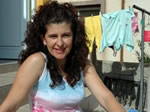
A European Social Fund programme providing day-care for dependent parents in Cyprus enables Koulla Aggelou, 38, to do her job as a cleaner, knowing her mother is well looked after.
In the little Cyprus village of Augorou, near Famagusta, stands a well-kept, century-old house. It has been newly renovated, with cheerful blue shutters, stone floor and traditional plaited wood ceiling. On a wall in the bright, airy entrance room, the message ‘Welcome to the Club 2007’ is picked out in lacework. Around a table, a group of elderly men and women – their faces weathered by years of work in the Mediterranean sun – smile and joke with one another as they thread large, round beads onto strings.
'Never Home Alone'
This is the heart of Augorou’s ‘Never Home Alone’ programme, launched in January 2007 and co-funded by the European Union through the European Social Fund. Its aim is to help women in the local community to work more easily by providing support and entertainment for the ageing parents they might otherwise have to stay at home to look after.
Improving the quality of life.
Koulla Aggelou is one of the 15 women who benefits directly. She has two children and works every weekday morning as a cleaner in the village, while her 71-year-old mother Fotini goes to the ‘club’. “Before the scheme started, life was very difficult,” she explains. “I didn’t have any time for myself, and sometimes not even for my family. I was always stressed and in a hurry.” She used to clean apartments in the nearby tourist resort of Ayia Napa, sometimes leaving home by bus at 6am in the morning, working 12-hour shifts, or coming home at 11 o’clock at night. “Sometimes it was so tiring I thought about quitting the job,” she admits. But the family needed her income. Her husband Angellos worked as a builder before finding a job in a local restaurant. “If I didn’t work, things would have been hard,” says Koulla.
The programme’s impact naturally extends to other son and daughters in the 15 families. The parents – the oldest is 88 – go to the centre every weekday morning. “The main purpose of the programme is not to take care of the old people, but to enable women to work,” confirms Andri Christoforou, who runs the club. “It gives them the time they need to look after themselves, and their families.” They can also obtain advice on employment opportunities.
A 'home from home'
But even if the parents are not the prime target group, the enjoyment they get at the centre is plain to see. Each morning is taken up with activities such as knitting, painting and jewellery-making. Sometimes they make their own coffee or cakes, jam and macaroni. “It’s like a home from home,” explains Andri. Three times a week, specialists –physiotherapists and doctors – are on hand to offer treatment sessions, and outings are arranged to exhibitions and museums. Since Augorou is a small village, most of the elderly people, including Fotini, are able to walk to the centre by themselves. But if the care team notices that someone is absent, they call to see how they are, and whether they need picking up. In the early afternoon, after a home-cooked lunch, the little group of pensioners makes its stately way home.
“It’s a really good programme, and the old people have fun,” declares Koulla. “It’s the first time we have had anything like this in the village. My mother used to worry because she knew I was stressed. Now she enjoys the activities, and we all feel better.”
“It’s good company and a pleasant way to pass the time,” nods Fotini, who has survived treatment for breast cancer. “The girls who run the club are really nice. I meet people of my own age and we tell stories of the old days. If I didn’t come here I would have to stay at home. And I’m pleased that my daughter is able to work more easily,”
So close is the feeling between Koulla and Fotini, it is perhaps surprising to know that their true relationship is step-mother and daughter. Koulla’s real mother died when she was less than a year old, leaving her father Costas with eight young children. She was just four when Fotini married her father and took on the daunting task of raising the family. “My step-mother brought me up like her own,” says Koulla gratefully. “I see her every day, and we can’t do without each other.”
More time and more fun
Koulla works from 7.30am to 1pm, five days a week. This means she can walk her 11-year-old twins Simeos and Fotini to school in the village, and meet them at the school gates at 2.30pm. They often call in at her parents’ house on the way home. She has time to prepare their lunch, help them with their homework, and supervise their out-of-school activities: dancing and English lessons.
“Before the programme started, I used to go to my mother’s to help her whenever I was free, and time was always an issue,” she explains. “Sometimes I used to have to stay with her in the morning and work in the afternoon, but now I have time for the children.”
Each week, Koulla cleans five different houses in Augorou. Christina Kaoulla, in her 80s, with nine children and many grandchildren, is one of the neighbours she has been helping for two years, and who welcomes her visits. For Koulla, the extra income is just one reason for working. “We’re friends, and we have fun,” she explains as she tidies pots of geraniums on Christina’s terrace. “It’s not only for the money.”
